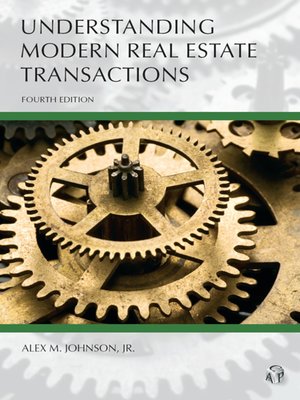
Sign up to save your library
With an OverDrive account, you can save your favorite libraries for at-a-glance information about availability. Find out more about OverDrive accounts.
Find this title in Libby, the library reading app by OverDrive.



Search for a digital library with this title
Title found at these libraries:
| Library Name | Distance |
|---|---|
| Loading... |
This Understanding treatise clearly and succinctly explains the myriad issues that arise and require discussion in advanced real estate courses. The author focuses on the typical chronology of a residential real estate transaction, from the date the seller decides to sell the real estate by listing it with a broker to the date the transaction is completed and the deed of sale is recorded in the applicable recorder's office. Students are thus easily able to access any issue that would confront the real estate student or practitioner.
Although the initial focus is on a residential real estate transaction, Understanding Modern Real Estate Transactions also addresses issues applicable to commercial real estate transactions. This treatise also provides case analysis, focusing on the cases that appear in the most prominent and widely used texts for modern real estate. Numerous simple hypotheticals throughout the text explain the more complicated theories and rules.
The Fourth Edition includes an expanded treatment of issues leading up to and arising from the real estate crisis, including the securitization of mortgages, the importance of the holder-in-due course, predatory lending, and foreclosures in a post-crash world. In addition, a chapter is devoted to detailing and explaining the legal effects of recently enacted Federal regulations that attempt to prevent a future mortgage meltdown. Also, given the increased importance of Homeowners' Associations and other Common Interest Communities, a chapter has been added explaining the law of servitudes or private zoning law.
Loaded with practical tips from a noted expert in real estate transactions, this treatise is beneficial for the neophyte and expert alike, providing insight on the issues likely to appear on exams from the professor's perspective. It is a must read for anyone interested in learning about real estate for the first time or anyone preparing for an exam in an advanced real estate course, including the bar exam.







